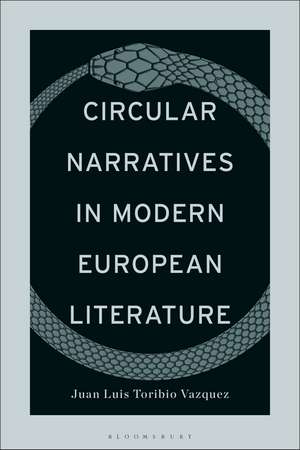Circular Narratives in Modern European Literature
Autor Juan Luis Toribio Vazquezen Limba Engleză Paperback – 24 ian 2024
| Toate formatele și edițiile | Preț | Express |
|---|---|---|
| Paperback (1) | 191.22 lei 43-57 zile | |
| Bloomsbury Publishing – 24 ian 2024 | 191.22 lei 43-57 zile | |
| Hardback (1) | 510.25 lei 43-57 zile | +109.13 lei 6-12 zile |
| Bloomsbury Publishing – 13 iul 2022 | 510.25 lei 43-57 zile | +109.13 lei 6-12 zile |
Preț: 191.22 lei
Preț vechi: 249.30 lei
-23% Nou
Puncte Express: 287
Preț estimativ în valută:
36.59€ • 38.06$ • 30.21£
36.59€ • 38.06$ • 30.21£
Carte tipărită la comandă
Livrare economică 14-28 aprilie
Preluare comenzi: 021 569.72.76
Specificații
ISBN-13: 9781501384912
ISBN-10: 1501384910
Pagini: 248
Dimensiuni: 152 x 229 x 25 mm
Greutate: 0.33 kg
Editura: Bloomsbury Publishing
Colecția Bloomsbury Academic
Locul publicării:New York, United States
ISBN-10: 1501384910
Pagini: 248
Dimensiuni: 152 x 229 x 25 mm
Greutate: 0.33 kg
Editura: Bloomsbury Publishing
Colecția Bloomsbury Academic
Locul publicării:New York, United States
Caracteristici
The first in-depth study of circular narrative structures in 20th-century European literature, this book broadens general understanding of narrative form and narrative circularity, in particular, through engagement with theories of (post)modernism, trans-nationalism and gender and sexuality
Notă biografică
Juan Luis Toribio Vazquez is Lecturer in Spanish and Literature at Sam Sharpe Teacher's College, Montego Bay, Jamaica. He is co-editor, with Thirthankar Chakraborty, of Samuel Beckett as World Literature (Bloomsbury, 2020)
Cuprins
Foreword by Shane Weller (University of Kent, UK)Acknowledgements1. Introduction: The Genealogy of Linearity 2. Nietzsche's Bequest: Buddha's Shadow and the 'Greatest Burden'3. The Birth of Circularity: Strindberg, Stein and Azorín4. 'Vivir es Volver': Queneau, Nabokov and Kharms5. Circulus Vitiosus Litterae: Joyce, Borges and the Theatre of the Absurd6. Circular Echoes: Robbe-Grillet, Calvino, Cortázar and Blanchot7. Conclusion: Circular Narratives in Modern European LiteratureReferencesIndex
Recenzii
In this groundbreaking work, Juan Luis Toribio Vazquez retraces the teleological view of literature through a wide expanse of texts, both narrative and of literary criticism - from Homer to Aristotle, Tasso and Schiller - before delineating how certain authors of modern literature rejected linearity in favour of circular forms of narrative. Built on Nietzschean philosophy, particularly on his idea of eternal recurrence, the book's close engagement with writers and dramatists, ranging from Strindberg to Nabokov, Joyce, Borges and Calvino, radically reconfigures the aesthetics grounding these texts. This brilliant account adds an important dimension to the evolution of the Western narrative.
Far from a mere typology, Circular Narratives in Modern European Literature is both ambitious in scope and quite original in dealing with its central premise. Toribio Vazquez offers a personal attempt to present and understand the many different circular alternatives probed by the 20th-century writers under the spell of Nietzsche's negative philosophy, a milestone for the contemporary collapse of linearity. His close readings compose an engaging picture of modernism(s) in Europe, sensitive to singularities and also particularly attentive of non-canonical names, such as Azorín and Kharns. A fine, comprehensive study, theory and analysis concerned.
In this wide-ranging comparative study Toribio Vazquez extends our understanding of post-Nietzschean poetics. His corpus of canonical and non-canonical 20th-century writers exploit structures of circularity for a variety of purposes, from the axiological and psychological to the existential and self-referential. This is an ambitious and impressive piece of work.
Far from a mere typology, Circular Narratives in Modern European Literature is both ambitious in scope and quite original in dealing with its central premise. Toribio Vazquez offers a personal attempt to present and understand the many different circular alternatives probed by the 20th-century writers under the spell of Nietzsche's negative philosophy, a milestone for the contemporary collapse of linearity. His close readings compose an engaging picture of modernism(s) in Europe, sensitive to singularities and also particularly attentive of non-canonical names, such as Azorín and Kharns. A fine, comprehensive study, theory and analysis concerned.
In this wide-ranging comparative study Toribio Vazquez extends our understanding of post-Nietzschean poetics. His corpus of canonical and non-canonical 20th-century writers exploit structures of circularity for a variety of purposes, from the axiological and psychological to the existential and self-referential. This is an ambitious and impressive piece of work.
